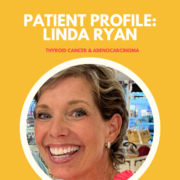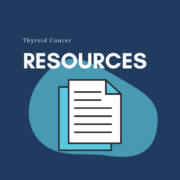Do You Need to See an Endocrinologist for Your Thyroid Disease?
This resources was originally published by the Verywell Health here.
In most cases, the diagnosis of a thyroid condition is made by a person’s primary care doctor, who may then refer you to an endocrinologist, a physician who treats hormone problems like thyroid disease and others. But that’s not always the case—or necessary. Sometimes, your general practitioner is comfortable managing your thyroid condition on his own, and this is perfectly sensible for certain thyroid diagnoses.
There are other healthcare practitioners, such as naturopaths and chiropractors, who also treat thyroid patients. While their expertise may be helpful as a complement to your thyroid care, it should not be a substitute for that of a primary care doctor or endocrinologist.
How to Work With Your Thyroid Medical Team
As managing thyroid disease can be challenging and is, in most cases, a lifelong commitment, it’s important to have the right team of professionals helping you along the way.
Thyroid Disease Doctor Discussion Guide
Get our printable guide for your next doctor’s appointment to help you ask the right questions.
:max_bytes(150000):strip_icc():format(webp)/illo_Doctor-discussion-guide-01-5c3e5b20c9e77c00015d2ba5.png)
Primary Care Doctors
Your primary care doctor may be able to manage your thyroid disease, especially if you are diagnosed with hypothyroidism. This is because most primary care doctors are comfortable and trained to monitor thyroid stimulating hormone (TSH) levels and adjust thyroid hormone replacement medication accordingly
That said, there are some specific situations that warrant a referral to an endocrinologist.
- If you are pregnant or planning pregnancy
- A newborn or child with a thyroid condition
- Presence of thyroid nodules or an enlarged thyroid gland (goiter)
- Any type of hyperthyroidism, including Graves’ disease
- Secondary hypothyroidism (if a pituitary problem is causing hypothyroidism)
- Thyroid eye disease
- Suspected thyroid cancer
Endocrinologists
An endocrinologist is a doctor who completes training in internal medicine (like a primary care physician) and then undergoes more training (usually two to three years) in the field of endocrinology.
Endocrinologists diagnose and treat hormonal imbalances, usually due to various gland conditions, such as:
- Thyroid disorders
- Diabetes
- Osteoporosis and bone health
- Adrenal disorders
- Pituitary disorders
- Menopause issues in women
- Testosterone problems in men2
While primary care doctors can manage some endocrine conditions, like “textbook” hypothyroidism and diabetes, other conditions warrant the care of an endocrinologist, like pituitary or adrenal gland problems or hyperthyroidism.
Even if you have “textbook” hypothyroidism, do not be surprised if your primary care doctor refers you to an endocrinologist. This can be for a number of reasons—perhaps you have multiple other medical problems (making your case a complex one), or perhaps your doctor does not have a lot of experience treating patients with such a disorder.
Sometimes, primary care doctors simply want an “extra set of eyes” from an endocrinologist, whether that’s taking a second look at your diagnostic test results and/or modifying your treatment plan—all of this is OK, if not, a sign of good care.
Depending on your diagnosis and treatment plan, your endocrinologist may opt to manage your condition on his own, as in the case of Graves’ disease or monitoring thyroid nodules.
Alternatively, your endocrinologist may work alongside your primary care doctor to manage your condition. For example, your primary care doctor may refer you to an endocrinologist for an initial diagnosis of Hashimoto’s disease. Once your endocrinologist stabilizes your thyroid hormone replacement dose, your primary care doctor may then follow your TSH levels. You may then only see your endocrinologist if a problem arises, or once a year for a check-in.
Other Practitioners
Many thyroid patients look to seek out 360-treatment plan—that is, one that includes the expertise of practitioners of different disciplines and takes a “whole body” approach. Naturopaths and chiropractors are two professionals who are sometimes consulted.
If you consult with these or other practitioners, be sure that you only do so as an adjunct to your care by a primary care doctor or endocrinologist. He or she should also be aware of any treatments recommended by other clinicians.
Naturopathic Doctors
A licensed naturopathic doctor (ND) graduates from a four-year graduate level holistic medical school. Their approach to healthcare tends to be more integrative perhaps than traditional doctors in that NDs believe no part of your body operates in complete isolation from the rest of the system.3
So, for example, an ND may discuss the aspects of how nutrition affects thyroid disorders and make sure that you have a diet plan that works to support your thyroid health. In addition, by ordering labs and imaging tests, an ND may evaluate other hormones such as the sex hormone estrogen and cortisol (the “stress hormone” produced by your adrenals glands).
Complement to Your Thyroid Care
While an integrative approach to your thyroid health is appealing, NDs do not necessarily follow the guidelines recommended by professional societies like the American Thyroid Association (ATA) or the American Association of Clinical Endocrinologists (AACE).
For instance, for the treatment of hypothyroidism, many NDs prescribe desiccated thyroid hormone, which is derived from the dried thyroid glands of pigs or cows and provides both T4 (thyroxine) and triiodothyronine (T3). Alternative names include natural thyroid, thyroid extract, porcine thyroid, pig thyroid; brand names include Nature-throid and Armour Thyroid.
This type of thyroid hormone replacement medication provides a ratio of T4:T3 that is not natural to humans (4:1 instead of 16:1), which tends to produce some degree of hyperthyroidism. That is why most expert bodies (the AACE and ATA, for instance) do not recommend its usage, except for perhaps select patients. Instead, for the vast majority of patients, experts recommend sticking with levothyroxine alone (brand names: Synthroid, Levoxyl, and Tirosint).4
Lastly, some NDs practice botanical medicine, recommending herbs for the care of various medical problems. Taking herbs and supplements can be especially harmful to a person with thyroid disease as they may interfere with your medication and/or the functioning of your thyroid gland.
Chiropractors
According to the American Chiropractic Association, chiropractors are designated as “physician-level providers,” in the vast majority of states. While the doctor of chiropractic (DC) program is similar to the doctor of medicine (MD) program in the first two years, the programs diverge in the second half. During this time, the DC program focuses on diet, nutrition, and spinal manipulation, while the MD program emphasizes the study of pharmacology.5
Complement to Your Thyroid Care
While your chiropractor may have been the one to diagnose your thyroid disease (they can order laboratory tests and imaging studies, like a naturopath), once diagnosed, your chiropractor must refer you to a medical doctor for proper treatment—for instance, thyroid hormone replacement for hypothyroidism and either an anti-thyroid drug, surgery, or radioactive iodine ablation for hyperthyroidism.
Chiropractors can, however, provide supportive thyroid care, such as nutritional guidance or ways to ease musculoskeletal pain associated with the underlying thyroid disease (like carpal tunnel syndrome or joint aches).
Chiropractors are legally prohibited from prescribing thyroid medication, which means that they cannot treat or cure thyroid conditions.
A Word From Verywell
The decision to find a doctor for your thyroid care can be a challenging one, as the relationship is an intensely personal one, and it’s not easy to find the right match, particularly when you may be limited by geography and insurance.
Remain proactive in seeking out the right doctor-patient relationship. And keep a positive mindset, too. When you find that trusting, compassionate partnership, you will just know it.










